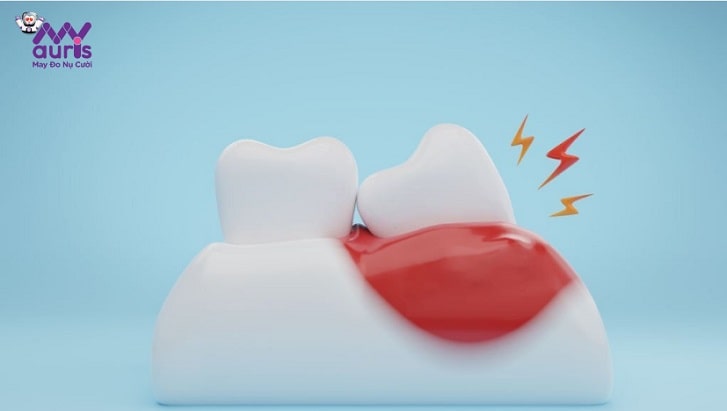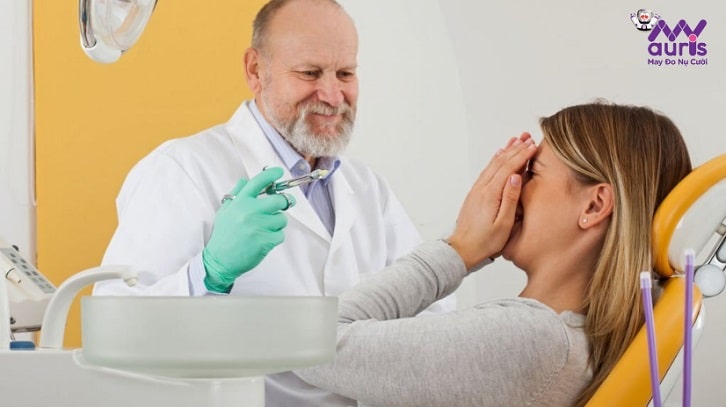Growing wisdom teeth is always an obsession for many people. Because they often come with symptoms such as pain, swollen gums, headaches, or even difficulty opening your mouth. So how to recognize the signs of wisdom teeth growing? The article below will join My Auris Smart Dentistry to provide more knowledge about wisdom teeth. From there, it helps you accurately and proactively identify the treatment process.
When do wisdom teeth start to grow?
Wisdom teeth are the name often called tooth number 8. This is the last tooth to grow, located in the innermost corner of the jaw. Wisdom teeth usually grow at the latest in adulthood from 18 to 25 years old, when the roots begin to form.
Wisdom teeth can grow straight (normal growth), grow at a 45.90 degree angle or grow underground, growing backwards at the back of the jaw. From there, they cause many oral health problems such as pain, red and swollen gums, fever or even difficulty chewing.
Furthermore, wisdom teeth cause a lot of controversy because their function is unclear and also causes a lot of trouble when they appear. Therefore, there are many conflicting opinions on whether wisdom teeth should be extracted or not.
Depending on the condition of the wisdom teeth growing, the patient will experience a number of different symptoms. However, in cases where wisdom teeth grow straight, there will be less pain or swelling.

6 most common signs of wisdom teeth eruption
The process of growing wisdom teeth will not take place continuously, it will depend largely on each person’s constitution. It usually takes about 3 – 5 months for wisdom teeth to fully emerge. Therefore, how to recognize the signs of wisdom teeth so you can handle them promptly.
Pain
Is the most common sign of wisdom teeth growing. Brings a feeling of pain from inside, making the owner of this tooth uncomfortable and unable to eat, drink, or even lose sleep due to the constant pain. Usually, this pain will last longer and become more intense as the tooth emerges from the gum. In cases where teeth are growing straight, impacted or growing crooked, this symptom is present.
Swollen gums
By adulthood, the jawbone will become firm and not grow in size. When there are signs of wisdom teeth growing, the gums will stretch, making the gum surfaceswelling accompanied by swollen gums around the teeth. This condition will stop until the wisdom teeth have grown stably.
Difficulty moving the jaw
When wisdom teeth grow, you will feel like your jaw becomes heavy, your cheeks are swollen or even difficult to move your mouth muscles when talking, laughing or chewing.
Fever or headache
A mild fever can occur when wisdom teeth grow. The cause of fever is that when wisdom teeth grow, the body temperature increases higher than normal. And the feeling of discomfort when teeth grow is also the cause of headaches, causing body temperature to be hotter than normal.
However, you should not worry too much about these fevers because they will not last long. When the wisdom teeth are fully grown, fever and headaches will no longer exist.
The feeling of not eating well
The cause of your loss of appetite is when wisdom teeth grow painfully, swallowing saliva, unable to open your mouth due to the pain from tooth number 8. Furthermore, in some cases fever is caused by them.
When food accidentally touches the gums that are about to grow, it will hurt a lot, the patient will not be able to chew and feel the food.

Bad breath
When wisdom teeth Growth will cause damage to the gum area. Furthermore, food will often get trapped inside, making it difficult to clean your teeth. From there, it leads to an unpleasant odor.
How to handle when wisdom teeth grow
Growing wisdom teeth not only causes long-term pain but also causes many uncomfortable feelings. Therefore, when there are signs of teething, you need to have a handle, specifically:
Check your teeth
If you look with the naked eye, it will be very difficult to determine whether you are growing wisdom teeth or not. Therefore, the best way is to go directly to the dentist for examination and advice from the doctor.
If you have wisdom teeth, the doctor will take an X-ray to determine whether the teeth grow straight or crooked. In case the teeth are crooked or impacted, the doctor will prescribe extraction to help you no longer feel pain and not affect other teeth.
Oral hygiene
When you have the signs of wisdom teeth growing just listed above, you need to clean your teeth more carefully. It’s best to use dental floss and mouthwash to clean plaque and leftover food stuck in between your teeth, etc. From there, you can avoid bacteria accumulating that causes diseases like tooth decay.
A reasonable diet
When wisdom teeth grow, you should not eat foods that are too hard or too heavy. chewy. Because they will easily stick to the position where wisdom teeth are growing. From there, it makes cleaning difficult and causes more pain.
The best way is to go to the nearest dentist for examination.

When should wisdom teeth be removed
Most wisdom teeth, when they grow in, cause discomfort for those who own them and affect the patient’s life. However, many people still wonder when to remove wisdom teeth.
In some cases below, wisdom teeth removal is often indicated:
- Wisdom teeth grow crookedly and push against the adjacent teeth (tooth number 7). Causes symptoms such as pain and infection;
- Wisdom teeth grow crookedly and cause awakening. This is also the reason why bacteria grow and form tooth decay. Therefore, they need to be removed to prevent dental diseases.
- The condition of wisdom teeth is accompanied by dental diseases or tooth decay.
In some cases, wisdom teeth need to be removed and you have diseases such as cardiovascular disease, diabetes, blood clotting disorders or tooth structure that affects the nerves and blood vessels. The ability to keep this tooth is high. However, patients need to keep their teeth clean and take care of their wisdom teeth properly according to the doctor’s instructions.
The above are answers to questions about signs of wisdom teeth growth. Hope this article will provide you with the necessary information. If you have any questions, please contact us via Fanpage or come directly to the dentist for thorough and detailed advice.
Kim Dung





